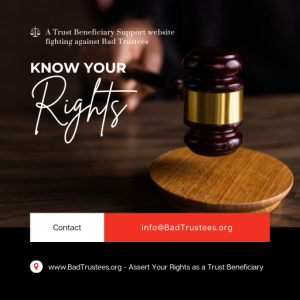Bad Trustees Newsletter
Can a spouse be held liable for a lying trustee?
Can a spouse be held liable for a lying trustee?Spouse Liability for Bad TrusteesYes, a spouse can...
Can a trust attorney be held liable for a lying trustee?
Signs of a Dishonest Trustee
A dishonest trustee can cause significant harm to beneficiaries and the trust itself. Here are common warning signs that a trustee may be acting dishonestly or in breach of their fiduciary duties.
Trustee inducing consent of a Beneficiary
Inducing consent from a trust beneficiary by a trustee is a serious breach of fiduciary duty, potentially leading to civil penalties, but not typically criminal charges, unless the trustee’s actions involve theft or embezzlement.
Example of a probate hearing where a trustee is held accountable for lying
Lying or concealing information from the court or beneficiaries can lead to serious legal consequences, including removal, civil penalties, and criminal prosecution.
How to push back effectively against an unfair or dishonest trustee
Two perspectives to help trust beneficiaries push back effectively against an unfair or dishonest trustee during probate.
Why are Beneficiaries at a disadvantage versus Trustees in a probate case?
Beneficiaries can be at a disadvantage compared to trustees in probate for several reasons, even though the law is technically on their side when a trustee acts improperly.
Why a trustee would lose a probate case?
A trustee might lose a probate case for several reasons, usually tied to breaching their legal duties or acting in bad faith.






